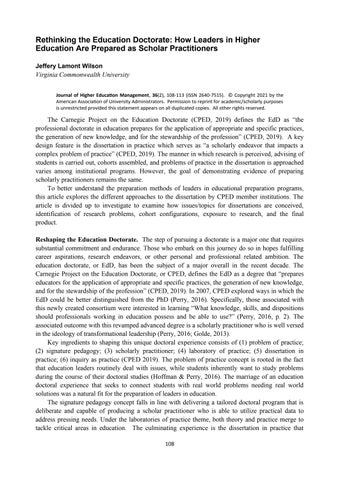Rethinking the Education Doctorate: How Leaders in Higher Education Are Prepared as Scholar Practitioners Jeffery Lamont Wilson
Virginia Commonwealth University Journal of Higher Education Management, 36(2), 108-113 (ISSN 2640-7515). © Copyright 2021 by the American Association of University Administrators. Permission to reprint for academic/scholarly purposes is unrestricted provided this statement appears on all duplicated copies. All other rights reserved.
The Carnegie Project on the Education Doctorate (CPED, 2019) defines the EdD as “the professional doctorate in education prepares for the application of appropriate and specific practices, the generation of new knowledge, and for the stewardship of the profession” (CPED, 2019). A key design feature is the dissertation in practice which serves as “a scholarly endeavor that impacts a complex problem of practice” (CPED, 2019). The manner in which research is perceived, advising of students is carried out, cohorts assembled, and problems of practice in the dissertation is approached varies among institutional programs. However, the goal of demonstrating evidence of preparing scholarly practitioners remains the same. To better understand the preparation methods of leaders in educational preparation programs, this article explores the different approaches to the dissertation by CPED member institutions. The article is divided up to investigate to examine how issues/topics for dissertations are conceived, identification of research problems, cohort configurations, exposure to research, and the final product. Reshaping the Education Doctorate. The step of pursuing a doctorate is a major one that requires substantial commitment and endurance. Those who embark on this journey do so in hopes fulfilling career aspirations, research endeavors, or other personal and professional related ambition. The education doctorate, or EdD, has been the subject of a major overall in the recent decade. The Carnegie Project on the Education Doctorate, or CPED, defines the EdD as a degree that “prepares educators for the application of appropriate and specific practices, the generation of new knowledge, and for the stewardship of the profession” (CPED, 2019). In 2007, CPED explored ways in which the EdD could be better distinguished from the PhD (Perry, 2016). Specifically, those associated with this newly created consortium were interested in learning “What knowledge, skills, and dispositions should professionals working in education possess and be able to use?” (Perry, 2016, p. 2). The associated outcome with this revamped advanced degree is a scholarly practitioner who is well versed in the ideology of transformational leadership (Perry, 2016; Golde, 2013). Key ingredients to shaping this unique doctoral experience consists of (1) problem of practice; (2) signature pedagogy; (3) scholarly practitioner; (4) laboratory of practice; (5) dissertation in practice; (6) inquiry as practice (CPED 2019). The problem of practice concept is rooted in the fact that education leaders routinely deal with issues, while students inherently want to study problems during the course of their doctoral studies (Hoffman & Perry, 2016). The marriage of an education doctoral experience that seeks to connect students with real world problems needing real world solutions was a natural fit for the preparation of leaders in education. The signature pedagogy concept falls in line with delivering a tailored doctoral program that is deliberate and capable of producing a scholar practitioner who is able to utilize practical data to address pressing needs. Under the laboratories of practice theme, both theory and practice merge to tackle critical areas in education. The culminating experience is the dissertation in practice that 108




